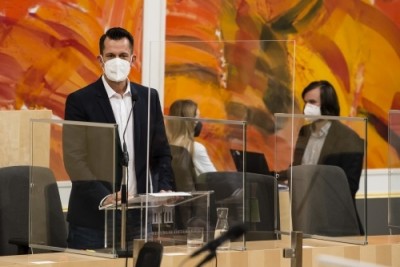Covid-19 in Austria: Restrictions Ease on July 1
Austria celebrates its next opening step on July 1. From then on, the nightly curfew is eliminated, clubs are allowed to re-open, and FFP2 masks can be exchanged for mouth-nose protection. Read more about the new regulations below.
 The Austrian Health Minister Wolfgang Mückstein has presented the newest Covid-19 opening regulations. / Picture: © Parlamentsdirektion / Thomas Jantzen
The Austrian Health Minister Wolfgang Mückstein has presented the newest Covid-19 opening regulations. / Picture: © Parlamentsdirektion / Thomas Jantzen
The Austrian Ministry of Health has presented the newest Covid-19 opening regulation, which will apply as of July 1. Due to rapidly increasing vaccination progress and continued low infection rates, these controlled opening steps are well within reach, according to a press release by the Austrian Ministry of Health.
The focus of the openings, as in the past, is the so-called 3-G rule. By demonstrating testing, recovery or vaccination, the regulations currently in place can be further relaxed while still accounting for people's safety in a certain way.
Thus, as of July 1, there will no longer be a curfew under the Covid-19 regulations, and the minimum distance of one meter and the square meter restrictions will also be dropped.
Health Minister Wolfgang Mückstein commented: "We have worked hard together to achieve the openings. Now it's the turn of the young people in our country in particular. They have had to refrain from quite a lot in the last year. Let's show solidarity now and stick to the rules. Please also keep all your vaccination appointments."
3-G Rule
The familiar 3-G rule, or proof of a lower epidemiological risk, remains in place.
As before, this applies in restaurants and bars, in services close to the body, in accommodation establishments, for gatherings with more than 100 participants, in recreational and cultural facilities (except museums, libraries, and archives), for travel buses and excursion boats in occasional traffic and at non-public sports venues.
The regulation also continues to apply to providers of mobile nursing and care services, to visitors and employees of old people's and nursing homes as well as inpatient residential facilities for the disabled, to residents for new admissions to old people's and nursing homes as well as inpatient residential facilities for the disabled, to visitors and employees of hospitals or convalescent homes as well as to employees of other places where health services are provided.
For gatherings of 100 persons or more, the district administrative authority must be notified; for gatherings of 500 persons or more, a permit is required. There is no longer an upper limit of persons under the Covid-19 regulations.
Change of Masks
A major change under the ordinance is the reintroduction of mouth and nose protection (MNS in German) instead of the FFP2 mask in many areas. Where 3-G evidence applies, the mask requirement is generally eliminated. There are exceptions for retirement and nursing homes and healthcare facilities.
As of July 1, the obligation to wear an MNS will again apply in enclosed spaces, such as public transportation and its stations, cabs, tramways and cogwheel trains, in customer areas, at administrative authorities and administrative courts when parties are in contact, at workplaces when customers are in contact and when parties are in contact.
Wherever a 3-G proof is necessary and is provided, the mask requirement can also be waived for employees. In addition, point-of-sale tests will no longer be valid in the future as part of occupational group testing.
However, the MNS requirement does apply to visitors and employees of retirement and nursing homes and inpatient residential facilities for the disabled, to visitors and employees of hospitals or health spas, and to employees, patients, visitors and accompanying persons of other places where health care services are provided. However, it is up to the respective institutions to provide stricter regulations here.
75% Capacity and Contact Data
For establishments in the restaurant industry where seating is not usually taken or is not taken for the predominant duration of the stay, i.e. in particular dance halls, clubs and discotheques, a maximum occupancy rate of 75% of the person capacity will apply from July 1.
The collection of contact data from persons who stay in the place in question for more than 15 minutes will continue.
This applies to restaurant, bars and clubs, lodging establishments, non-public sports venues, non-public recreational facilities, and gatherings of 100 or more attendees.



